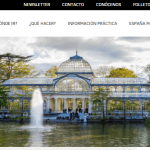The Secretary of State for Tourism, through SEGITTUR, analyses more than 20 cases of tourism use so that the Smart Destination Platform (PID) responds to their needs.
The objective of the Smart Destination Platform is to make shared services available, which incorporate a collection of digital solutions to manage the main problems, challenges and opportunities for improvement, on a digital and physical level, throughout the stay cycle of the tourism destination.
Given the complexity and diversity of the Spanish tourism market and ecosystem, the PID must be adapted to the specific needs presented by the different tourism market segments and niches.
To this end, around twenty use cases have been identified for the definition and incorporation into the PID of the specific needs of these segments in relation to the tourist’s stay cycle, strategies and management of the destination, the identification of data generated, and the solutions needed to define the problems and challenges they experience in order to act on them.
In each of the use cases, the problem, challenge or opportunity for improvement is identified, the associated useful data is located to manage the challenge, and the intervention capabilities are defined to launch public or private actions for improvement. In some cases, this is complemented by the identification of technological solutions that support management and that will be integrated into the PID, as well as the creation of a repository of necessary ontologies that promote a framework for interoperability.
Each use case will define the main processes for digitalisation, the needs for interaction with the connected tourist, and the associated data strategy. This information will be used, in some cases, to generate technological solutions that will be integrated into the platform.
Examples
The use cases currently being worked on are the ontology for the tourism sector, measurement of the tourist’s “customer journey”, hotels providing data, measurement of the impact of cruises, methodology for measuring the economic impact of tourism locally, challenges in beach management, universal accessibility, measurement of the impact of events, wine tourism, measurement of flows, MICE tourism, sports tourism, cultural and heritage tourism and marinas.
Health tourism, intermodality, equestrian tourism, thermal tourism and pet tourism, among others, will soon begin.
In the use cases, we also work with destinations linked to the tourism types, including Sitges, Salamanca, Malaga, Benidorm, Calvià, Seville, Las Palmas, Noja, Puebla de Sanabria, Torremolinos, Fuengirola, Palma, Gijon, Jerez de la Frontera, Logroño, Ibiza, Madrid, La Nucía, Alcobendas, Valencia, Provincial Council of Huesca, Provincial Council of Palencia, Oviedo and Avilés, among others.
All information derived from the use cases will be published on the SEGITTUR website.





